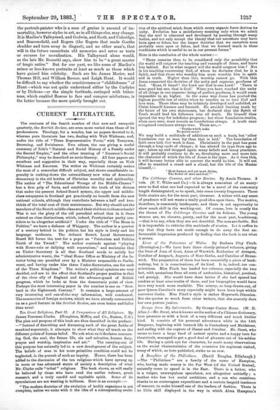Ten Great Religions, Part II. A Comparison of All Religions.
By
James Freeman Clarke. (Houghton, Mifflin, and Co., Boston, U.S.) The plan and purpose of this book are thus described in the preface : —" Instead of describing and discussing each of the great faiths of mankind separately, it attempts to show what they all teach on the different points of human belief. We ask what each declares concern- ing God, the soul, the future life, sin and salvation, human duty, prayer and worship, inspiration and art." The carrying-out of
this purpose has naturally led to a new development of the subject. The beliefs of man in his more primitive condition could not be neglected, in the pursuit of such an inquiry. Hence, there has been added to the discussion of the ten religions which have sprung up
in more or less advanced states of society a description of what Mr. Clarke calls "tribal" religions. The book shows, as will easily be believed by those who have read the earlier volume, great research and a truly candid and equitable spirit. Some of its speculations are not wanting in boldness. Here is an example :—
" The modern doctrine of the evolution of bodily organisms is not complete, unless we unite with it the idea of a corresponding evolu- tion of the spiritual mind, from which every organio force derives its unity. Evolution has a satisfactory meaning only when we admit that the soul is educated and developed by passing through many bodies, and not only accept the theory that our ancestors may have been apes or fishes, but the larger doctrine that we ourselves were probably once apes or fishes, and that we learned much in these conditions which is useful to us in our present forms."
Here is the conclusion of the whole matter :—
" There remains then to be considered only the possibility that the world will outgrow the teaching and example of Jesus, and leave him behind. But in what respect will the world outgrow him ? Not in his teaching concerning God, of whom be declares that he is a Spirit, and that those who worship him must worship him in spirit and in truth. Higher than this, worship cannot go. With this Jesus connected the doctrine of the unity and supreme goodness of God. 'Hear, 0 Israel ! the Lord our God is one Lord." There is none good but one, that is God.' When you have reached the unity of all things in one supreme being of perfect goodness, it would seem impossible to go higher. In the same way Jesus has posited-the highest possible law of ethics when he teaches us to love God and love man. These ideas may be infinitely developed and unfolded, as Christ himself foresaw and foretold. He avoided limiting truth by the letter of his own statements, but declared that the Spirit of Truth would lead his followers into all truth. He himself thus opened the way for indefinite progress ; but these foundation-truths, when once seen, must remain as foundations always. A truth once recognised continues always true. These are,— 'Truths which wake To perish never.'
We may build a multitude of additions on such a basis, but other foundation can no man lay than that is laid.' The foundation of faith once laid, that work is done. Christianity in the past has gone through a long cycle of change ; it has altered its type from age to age; taken up and dropped again many beliefs and many practices. It will probably continue to do so, developing more and more into the character of which the life of Jesus is the type. As it does this, it will become better able to convert the world to him. It will not offer to mankind a creed and a ritual, but the life of the Master
' Most human and yet most divine, The flower of man and God. "


































 Previous page
Previous page